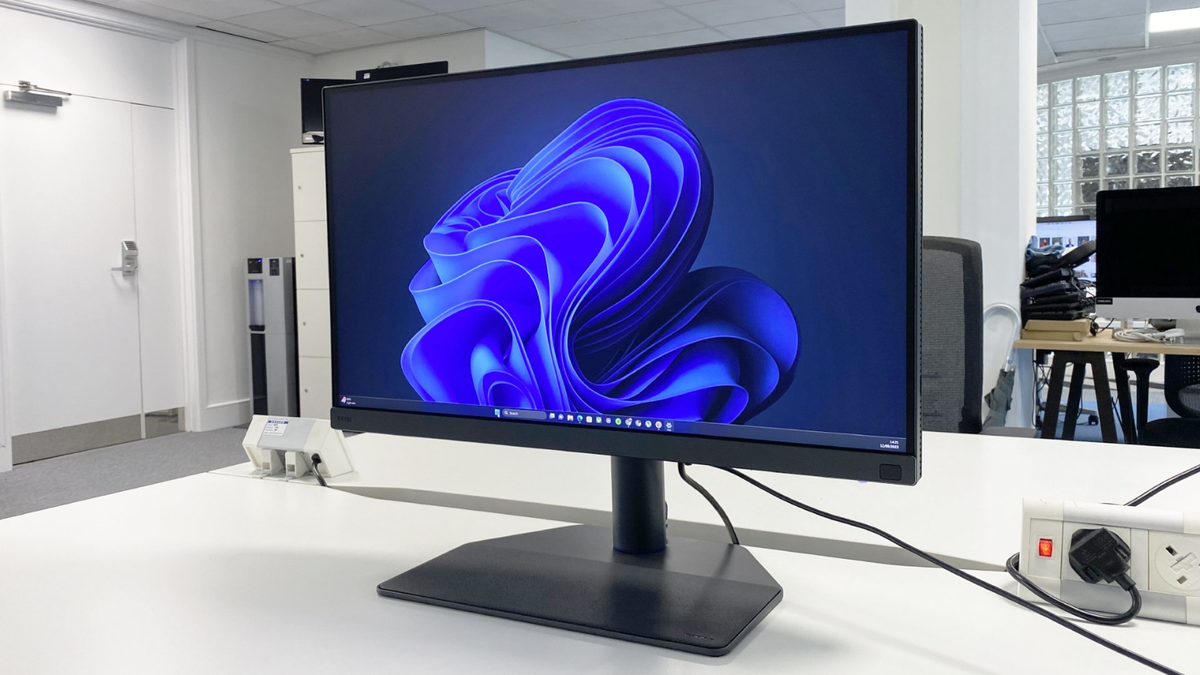27-inch 4K monitors aimed at pro and semi-pro content creation workflows are awfully common these days and span a wide range of price points. So, what makes the new BenQ PhotoVue SW272U stand out in this crowded segment?
The core panel specs look pretty standard at a glance. IPS, 4K, 60Hz, 400 nits, you’ve seen it all before. However, the 99% coverage of both Adobe RGB and DCI-P3 hint at something at least a little bit special, as does the guaranteed sub-1.5 DeltaE factory calibration. Actually, so does the pricing, which is rather high at around $1599 / £1199.
That pricing is particularly painful given this isn’t a true HDR monitor. It does support HDR10 and HLG. But with that 400 nits peak brightness and no local dimming, the actual HDR performance on offer is extremely limited.
It’s also conspicuous that monitors like the Asus ProArt PA348CGV offer seemingly the same broad specs and feature set for one third of the money. Ouch. However, the difference here is that the BenQ PhotoVue SW272U is pitched as a true pro-level display at a relatively low price, while that Asus is more prosumer or semi-professional. Whether the extra precision, features and performance this BenQ delivers are worth the money, well, at least in part that comes down to your workflows and requirements.
BenQ PhotoVue SW272U: Design & features
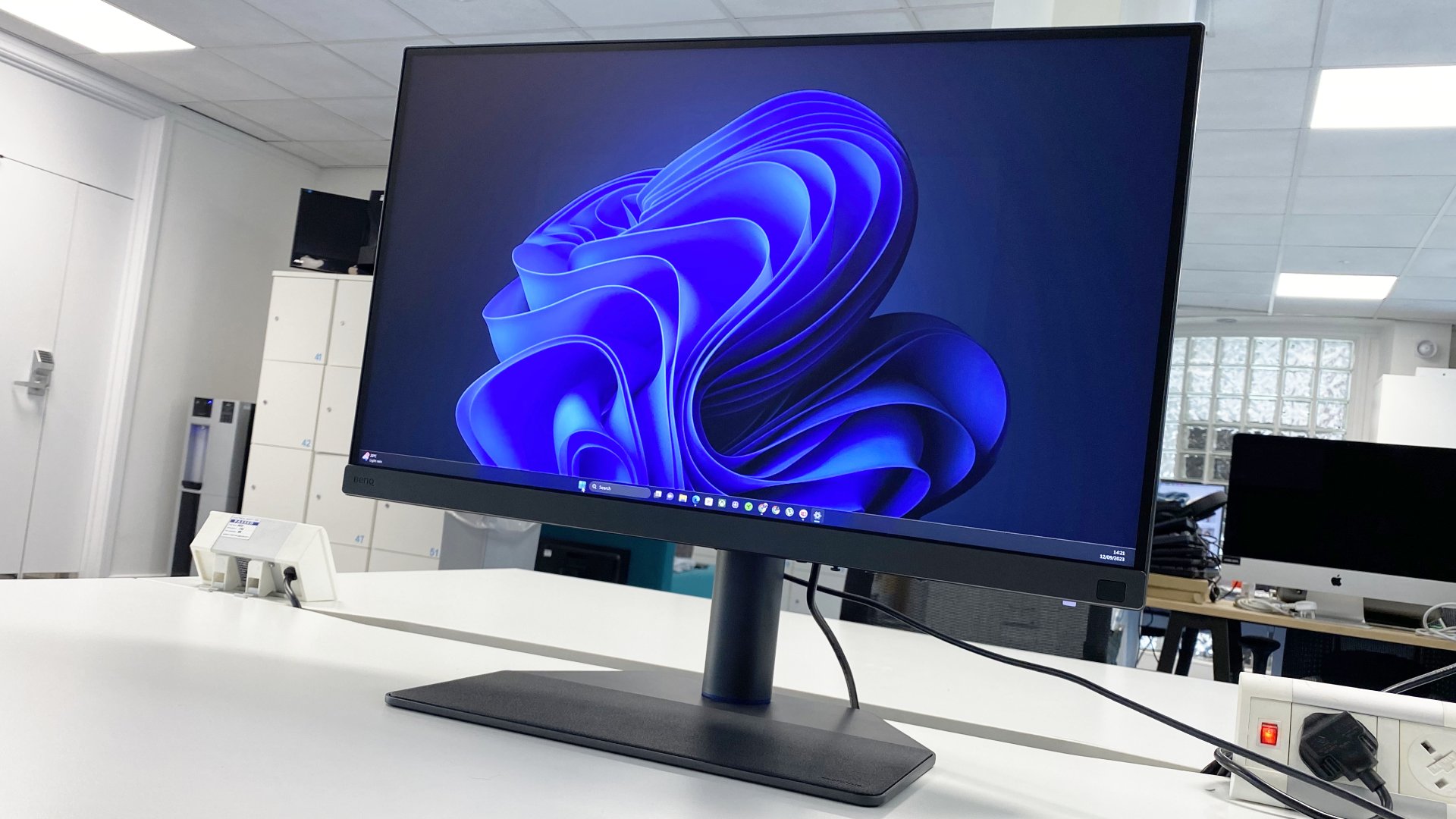
- Very solid build quality
- Slightly dowdy design
- Strong overall feature set
- But limited HDR support
- Great usability features
Specs
Panel size: 27-inch
Panel type: IPS
Resolution: 3,840 x 2,160
Brightness: 400cd/m2
Contrast: 1,000:1
Pixel response: 5ms
Color coverage: 99% Adobe RGB, 99% DCI-P3
Refresh rate: 60Hz
Vesa: 100mm x 100mm
Inputs: DisplayPort 1.4 x2, HDMI 2.0 x2, USB-C with 90W power delivery
We’ve reviewed plenty of the best business monitors, and there’s no hiding it: the BenQ PhotoVue SW272U doesn’t exactly turn heads for sheer design flair. For the most part it’s a fairly dowdy all-grey display, albeit the slim bezels on three sides of the panel keep things reasonably contemporary. The stand in particular is very nicely engineered and supports height, swivel, tilt and rotate into portrait.
It’s also worth noting that the shading hood bundled with the display and designed to reduce ambient light glare includes attachments for both landscape and portrait viewing, which is unusual.
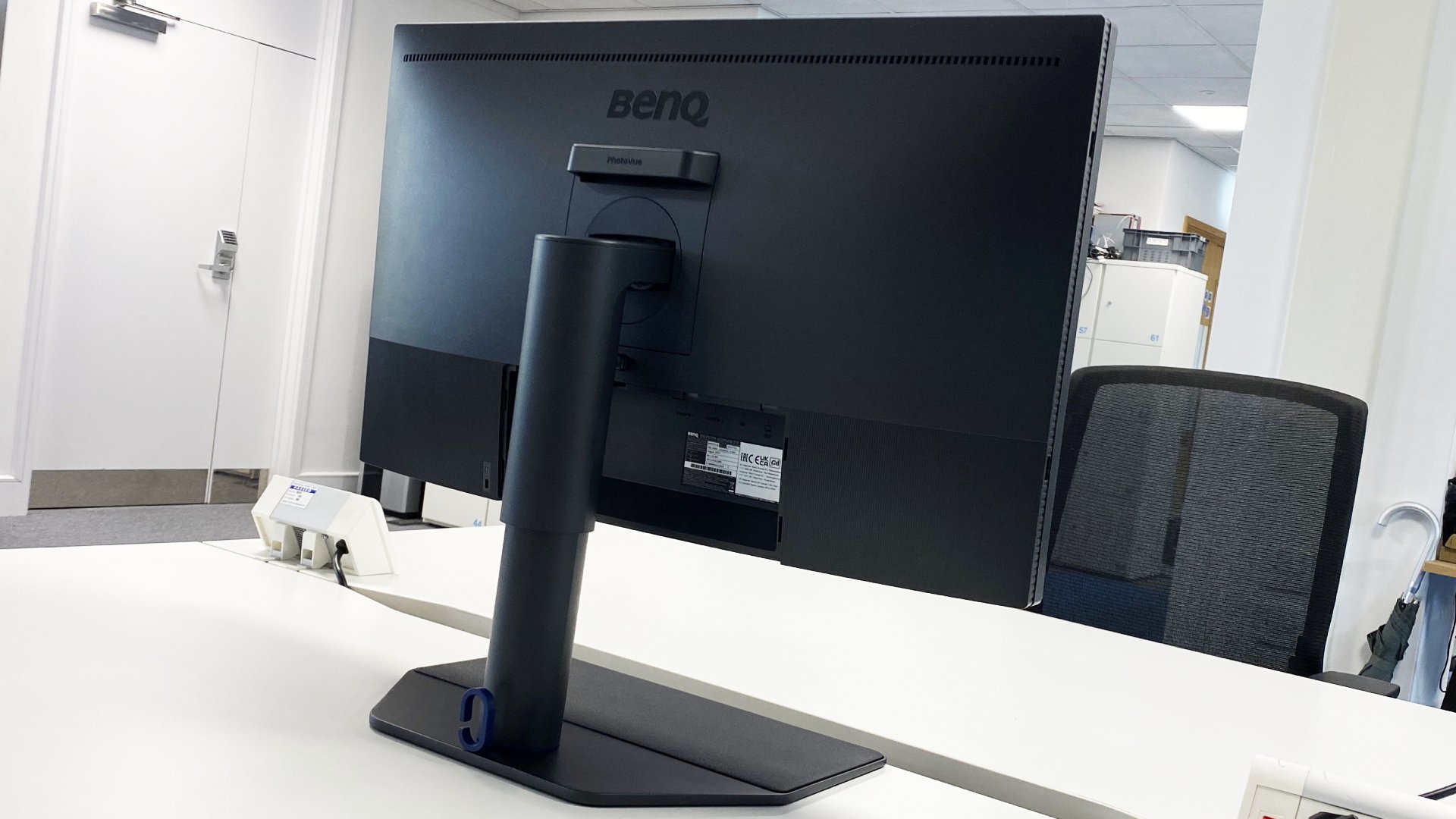
Another notable design feature is the flat base with an inlaid leatherette pad. The pad itself is a little hard and feels cheap. However, the ergonomic benefit of the flat base is that you reclaim usable desktop space where conventional stands simply eat it up.
The 27-inch 4K IPS panel ticks the usual boxes for resolution, contrast and refresh rate for this class of display. However, the finer details place it in a much higher class than more affordable competition.
The full list of features is phenomenally long. However, highlights include 99% coverage of both Adobe RGB and DCI-P3 hint, sub-1.5 DeltaE factory calibration, a 16-bit LUT, both Calman verification and Pantone validation, plus support for 24, 25 and 30fps video to allow smooth playback with no jitters. Like several BenQ displays we’ve tested, these specs point to one of the best monitors for photo editing or other creative workflows.
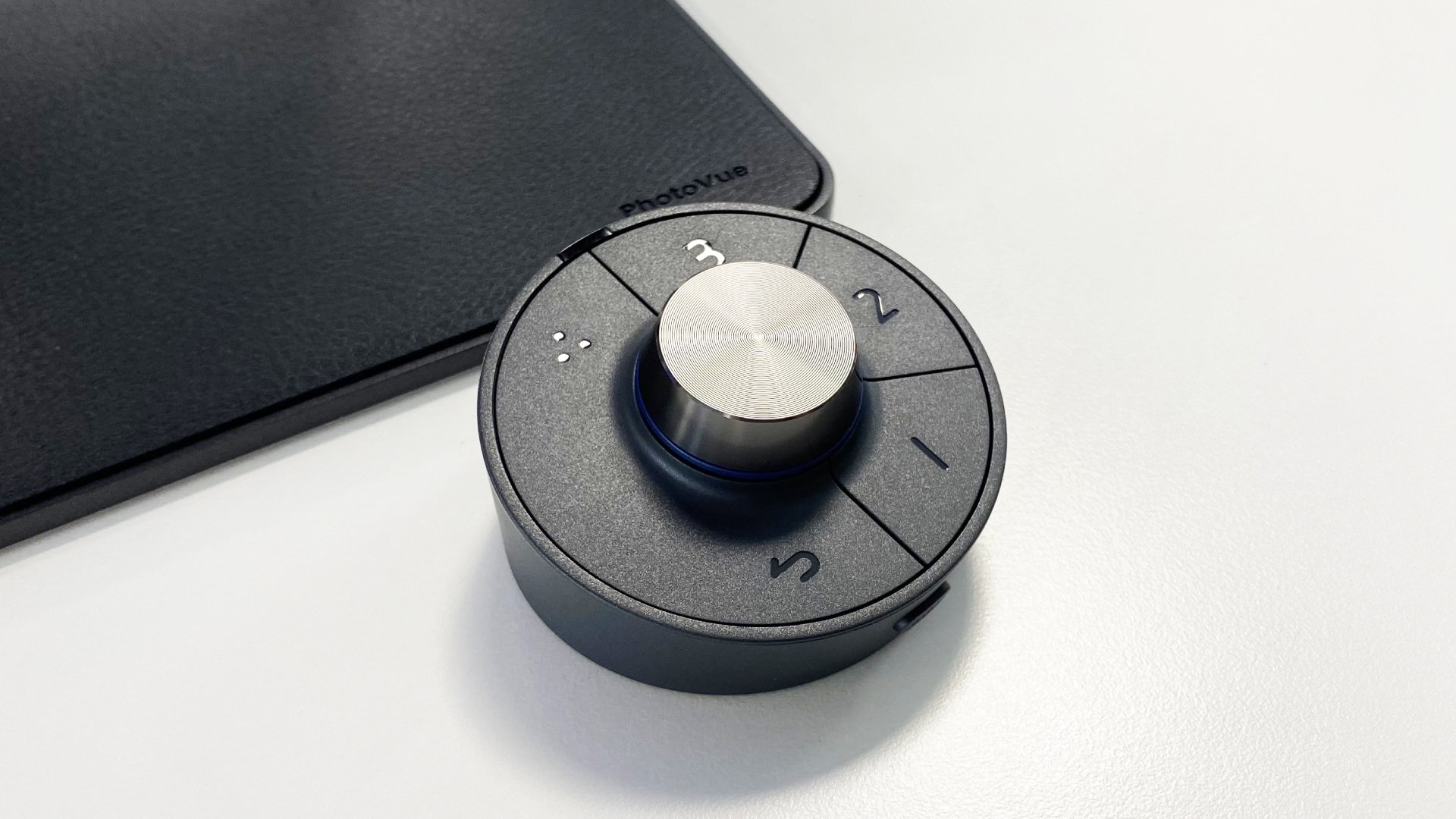
However, it’s not perfect, and not professional-grade. The panel supports 10 bits per colour channel, however that is achieved via 8-bit native panel support plus dithering. That’s one measure by which even more expensive pro displays are typically superior, offering native 10-bit colour without dithering. Rounding out the specs are support for both Calman and Lightspace hardware calibration, along with BenQ’s own calibration app.
As for connectivity, you get dual HDMI 2.0 ports, DisplayPort 1.4 and USB-C with 90W power delivery. There’s also an SD card reader and a dual-port USB-A hub. As handy as the SD card reader sounds, bandwidth to it is limited when using the USB-C interface to drive the display.
Final flourish is the hotkey puck. The basic idea isn’t novel. Chiefly, it allows easier access to the OSD menu, plus three quick-jump calibration slots. The novel bit is that it’s wireless and communicates over IR. That’s a genuine benefit in terms of minimising cable clutter.
The puck also ties in with BenQ’s Palette Master Ultimate or PMU hardware calibration app. One of the cleverer upshots of this combo is that, in MacOS, when you switch profiles with the hotpuck, MacOS automatically switches colour spaces to match. Nice. The info button on the puck is handy, too. That shows the current configuration information so that you can easily see what calibration you are running without the need to dig down into multiple layers of OSD menu. Useful if you regularly swap between workflows and calibrations.
BenQ PhotoVue SW272U: Performance
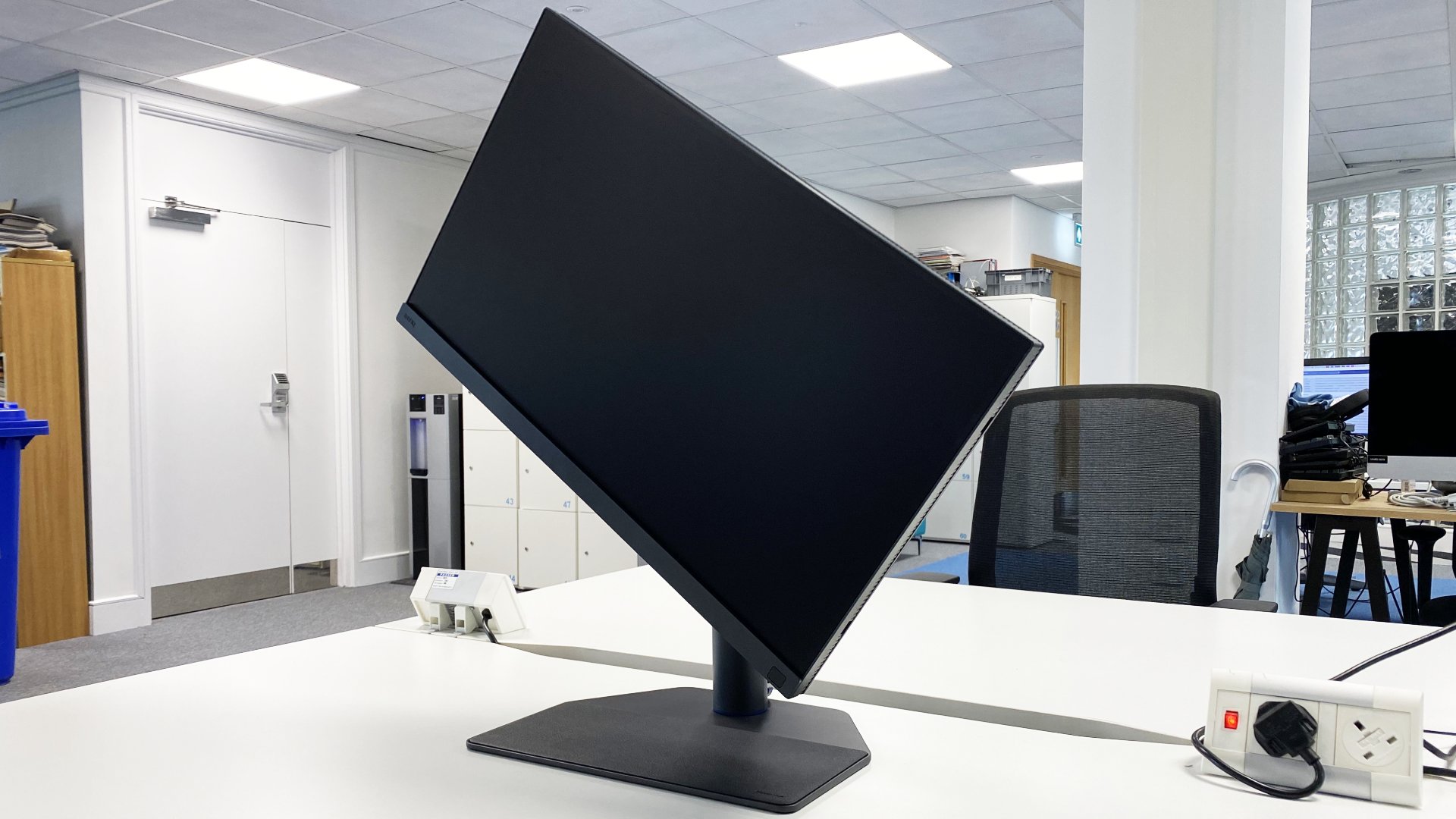
- Beautifully calibrated
- Novel anti-glare coating
- Limited HDR performance
Make no mistake, this is a beautifully calibrated display. Out of the box, it’s one of if not the most accurate displays we’ve seen. Colors are crisp and vibrant, but the balance is bob on with no hint of oversaturation, banding or really any calibration flaws.
Of course, this is an IPS display with a monolithic backlight, so it does have limitations. So, there’s inevitably a degree of light bleed. That said, the contrast is about as good as we’ve seen for this class of monitor, albeit it’s well behind an LCD monitor with local dimming, much less an OLED display. The viewing angles are also excellent.
On a related note, the SW272U has a new anti-glare coating design to reduce unwanted reflections even further compared with existing matte coatings. It genuinely does and without impacting perceived contrast. It’s a definite will.
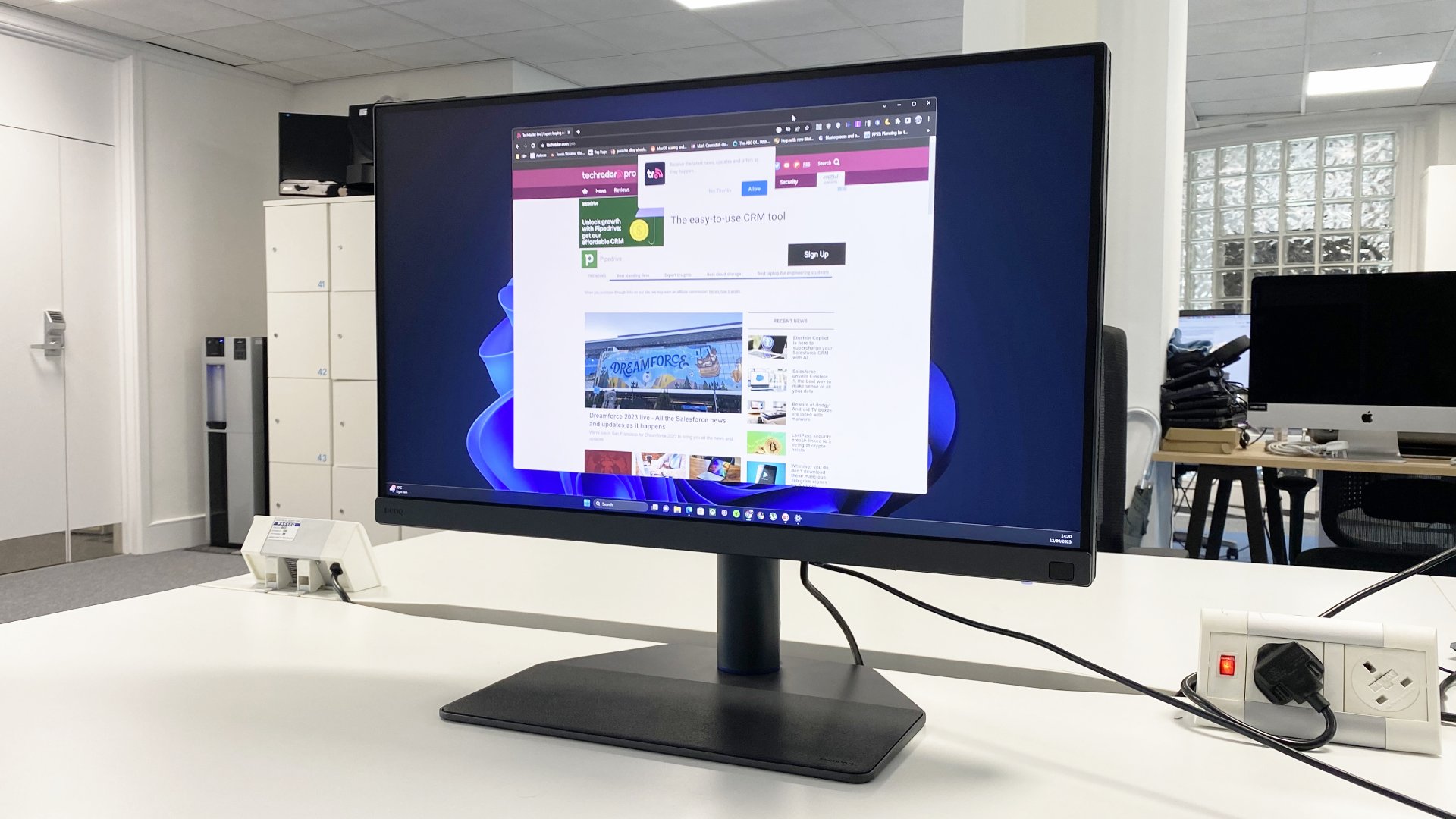
Less successful is the panel’s HDR performance. With no local dimming and a peak brightness of 400 nits, this monitor was never going to be a true HDR display. But it’s worth reaffirming that this isn’t the monitor you want if grading HDR content is a significant part of your workflow.
However, what is impressive is SDR content rendering in HDR mode. As with every other mode, the HDR mode is brilliantly calibrated for both HDR and SDR content. In terms of SDR content accuracy in hDR mode, this monitor is perhaps the best we’ve ever seen.
Speaking of modes, the OSD offers most of the key colour spaces pre calibrated, including Adobe RGB, Rec. 709 and DCI-P3. And like many of the best monitors for MacBook Pro, there’s also an “M-Book” mode, designed to match the factory calibration of Apple‘s MacBook monitors.
Beyond that, you get the usual upsides of a 27-inch monitor with 4K resolution and consequent 163DPI pixel density. Fonts look crisp and clear, especially in macOS but also in Windows, and there’s plenty of image detail on offer.
BenQ PhotoVue SW272U: Final verdict
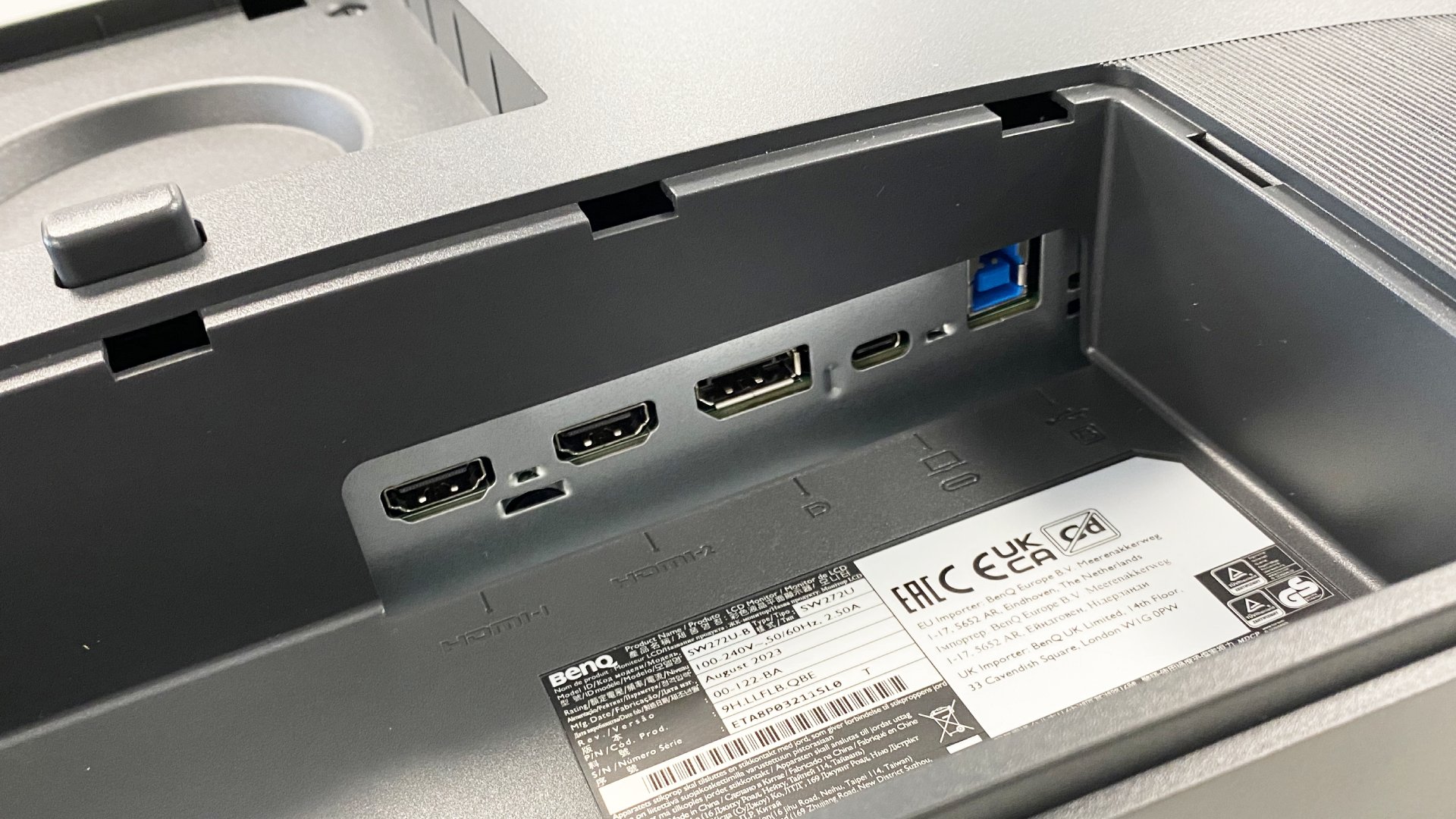
The BenQ PhotoVue SW272U is an excellent monitor with one obvious problem, cost. Depending on how you look at it, this display is either very much worth the money or very hard to justify.
In particular, the Asus ProArt PA279CRV – our pick for best video editing monitor on a budget – makes for an uncomfortable comparison. That’s another 27-inch 4K panel aimed at content creators. It matches BenQ’s monitor with 99% coverage of both Adobe RGB and DCI-P3. But it cost one third the price.
What the Asus can’t do is compete with the PhotoVue SW272U outstanding calibration accuracy or some of its features. For the serious content creator, it’s one of the best monitors for graphic design, photo editing, and video work. Features like the shading hood, hotkey puck and multiple calibration profiles can make all the difference to effective and efficient execution of workflows.
Likewise, compared to true professional class monitors, the BenQ PhotoVue SW272U arguably isn’t that expensive. Ultimately, then, it comes down to the sort of content creator you are. More casual, semi-professional creators are probably better off with the likes of the cheaper Asus ProArt PA279CRV. But for really serious professionals, there’s an awful lot to like with this BenQ. It’s almost certainly worth the extra investment.
Pair the BenQ PhotoVue SW272U monitor with the best business computers – tested, reviewed, and rated by us

